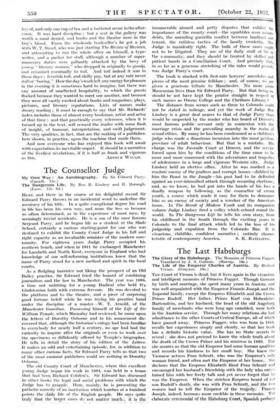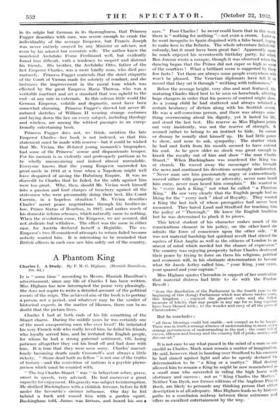The Last Habsburgs
TuE Court of Vienna is dead, but it lives again in the vivacious and intelligent memoirs of Princess Fugger. Though German by birth and marriage, she spent many years in Austria, and
was well acquainted with the Emperor Francis Joseph and the Imperial family, except the Empress Elizabeth and the Crown Prince Rudolf. Her father, Prince Karl von Hoherilohe- Bartenstein, and her husband, the head of the old Augsburg family of merchants who were long ago ennobled, were both in the Austrian service. Through her many relations she had admittance to the other Courts of Central Europe, all of which have passed away. •Princess Fugger, who was born in 1864,
recalls her experiences simply and clearly, so that her book has a definite historic value. She has no State secrets to reveal ; she does not pretend to know the whole truth about the death of the Crown Prince and his mistress in 1889. But she assures us that the old Emperor had some human qualities and records his kindness to her small boy. She knew the Viennese actress Frau Schratt, who was the Emperor's only woman friend, and often met the Emperor at her house. She declares that the Empress Elizabeth liked Frau Schratt and encouraged her husband's friendship with the lady who enter- tained him with her lively talk and yet never forgot that he was the Emperor. When the stricken Empress heard of her son Rudolf's death, she was with Frau Schratt, and the two women had to tell the Emperor of the tragedy. Francis
Joseph, indeed, becomes more credible in these memoirs. The elaborate ceremonial of the Habsburg Court, Spanish perhaps
in its origin but German in its thoroughness, that Princess Fugger describes with care, was severe enough to crush the individuality of the average Emperor, but Francis Joseph was never entirely swayed by any Minister or adviser, not even by his adored but eccentric wife. The author knew the murdered Archduke Franz Ferdinand well, but evidently found him difficult, with a tendency to suspect and distrust his friends. His brother, the Archduke Otto, father of the last Emperor Charles, was a more kindly man, who died pre- maturely. Princess Fugger contends that the strict etiquette of the Court of Vienna made for sobriety of conduct, and she instances the improvement in the moral tone which was effected by the great EmpresS Maria Theresa; who was a veritable martinet and set a standard that was upheld to the end—at any rate in externals. In this solemn little world the German Emperor, volatile and dogmatic, must have been somewhat alarming. Princess Fugger's shrewd but never ill- natured sketches of William II wearing strange costumes and laying down the law on every subject, including theology and wireless, are among the wittiest passages in an excep- tionally entertaining book.
Princess Fugger does not, we think, mention the late Emperor Charles—her book is not indexed, so that this statement must be made with reserve—but it. could be wished that Mr. Vivian, the ill-fated young monarch's biographer, had some of the Princess' serene and dispassionate temper. For his memoir is so violently and grotesquely partisan as to be wholly unconvincing and indeed almost unreadable. Everyone knows that the young Emperor succeeded his great-uncle in 1916 at a time when a Napoleon might well have despaired of saving the Habsburg Empire. It was no discredit to Charles that he failed, for the odds against him were too great. Why, then, should Mr. Vivian work himself into a passion and hurl charges of treachery against all the statesmen who were presumably doing their best, like Count Czernin, in a hopeless situation ? Mr. Vivian describes Charles' secret peace negotiations through his brother-in- law, Prince Sixtus of Bourbon, in 1917, and makes much of his domestic reform schemes, which naturally came to nothing. When the revolution came, the Emperor, we are assured, did not abdicate but withdrew. The effect was the same in either case, for Austria declared herself a -RepSiblic. The ex- Emperor's two ill-considered attempts to return failed because nobody wanted him. It. is interesting to be reminded that British officers in each case saw him safely out of the country.















































 Previous page
Previous page